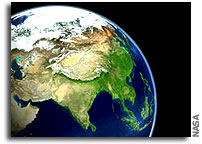Major Events of Indian Space Programme During 2004

The year 2004 was quite eventful for the Indian space programme. The
successful launch of EDUSAT by India’s own launch vehicle, GSLV, on
September 20, 2004, was an important landmark. It was the first operational
flight of GSLV and its success demonstrated the reliability of the vehicle.
The launch of EDUSAT, India’s first thematic satellite dedicated for
educational services, the inauguration of the first cluster of Village
Resource Centres and further expansion of Telemedicine network reiterated
India’s commitment to use space technology for societal applications. The
India-US Conference on Space Science, Applications and Commerce marked a new
beginning in the India US space cooperation.
The following were the important events of the Space Programme during 2004.
January 28, 2004: Inauguration of EDUSAT Pilot Project:
ISRO launched the EDUSAT pilot project in Karnataka as part of the first
phase of EUSAT programme. Under the pilot project, Visveswaraya
Technological Institute has networked about 100 engineering colleges for
conducting technological courses.
February 1, 2004: Atmospheric Aerosol Campaign Begins:
ISRO launched a month-long campaign on atmospheric aerosols. During the
campaign, vehicle equipped with sophisticated instruments traveled 6,000 km
in south India to measure physical, chemical and optical properties of
aerosols and trace gases along the road corridors. The campaign, carried out
as part of Geospher-Biosphere Programme, was to obtain a better insight of
properties and composition of aerosols and their distribution across various
latitudes.
June 21-25, 2004: India-US Conference:
The India-US Conference on Space Science, Applications and Commerce was held
at Bangalore during with the objective of strengthening and expanding the
cooperation between India and the US in the field of space science and
applications as well as related commercial activity. About 550 delegates
including 200 from US attended the conference, which culminated with the
issue of a Vision Statement for enhanced cooperation between the two
countries.
August 19, 2004: Airdrop Test of Space-capsule Recovery Experiment:
The airdrop test of the Space-capsule Recovery Experiment (SRE) was
successfully conducted on from Satish Dhawan Space Centre (SDSC) SHAR,
Sriharikota. SRE is intended for demonstrating the technology to recover a
500 kg orbiting space capsule that will be launched by Polar Satellite
Launch vehicle (PSLV) during the second half of 2005.
September 20, 2004: GSLV Launches EDUSAT:
In its first operational flight, India’s Geo-synchronous Satellite Launch
Vehicle, GSLV, successfully launched from Satish Dhawan Space Centre SHAR,
Sriharikota, the country’s first thematic satellite dedicated to educational
services, the 1950 kg EDUSAT, into a precise predetermined Geo-synchronous
Transfer Orbit (GTO). EDUSAT has since been positioned in its designated
orbital slot at 74 degree East longitude in the 36,000 km high
Geo-synchronous orbit.
October 18, 2004: Satellite-based Village Resource Centres Inaugurated:
The Prime Minister inaugurated the first cluster of four Village Resource
Centres (VRC) in Tamil Nadu, established jointly by ISRO and the M S
Swaminathan Research Foundation. VRC is a totally interactive VSAT (Very
Small Aperture Terminal) based network to provide space enabled information
and a variety of services like tele-education, telemedicine, online decision
support, interactive farmers’ advisory services, tele-fishery, e-governance
services, weather services and water management. VRCs will also provide
connectivity to speciality hospitals thus bringing the services of expert
doctors closer to the villages.
November 12, 2004: MOU Signed for Indo-French Satellite
Mission–Megha-Tropiques:
ISRO signed a Memorandum of Understanding with the French Space agency,
CNES, for the development and launch of an atmospheric satellite,
Megha-Tropiques for investigating the contribution of the water cycle in the
tropical atmosphere to climate dynamics. India will build the
Megha-Tropiques spacecraft and will also launch the satellite using its PSLV
as well as maintain the satellite in orbit, receive, process and distribute
the scientific data from the satellite. While two of the scientific
instruments for the satellite will be designed and built by CNES, the third
will be jointly built by ISRO and CNES. The launch is planned by 2008-2009.
November 22-26, 2004: International Lunar Conference:
The Sixth International Lunar Conference was organised at Udaipur to discuss
current results on lunar science, including questions regarding its origin
and resources, the future prospects of creating a lunar base for planetary
exploration and possible human settlement. India’s Chandrayaan-1 mission
slated for 2007-08 drew international attention during the conference.









